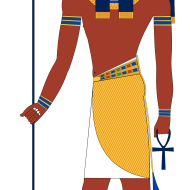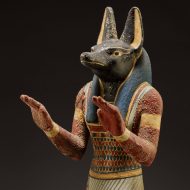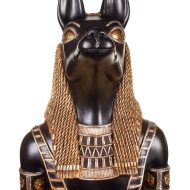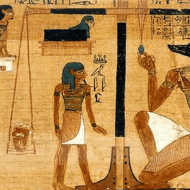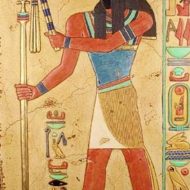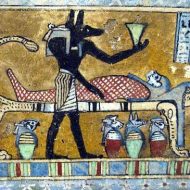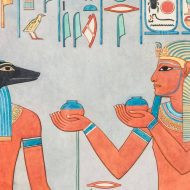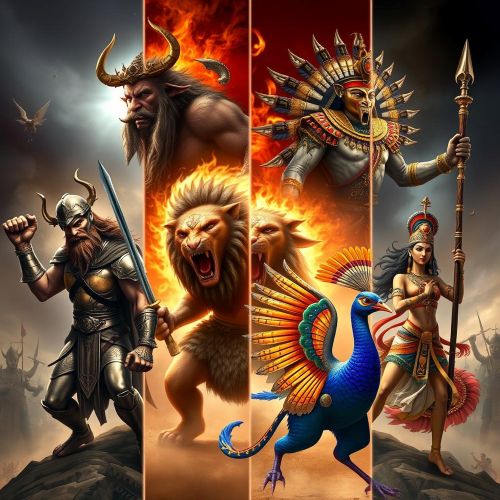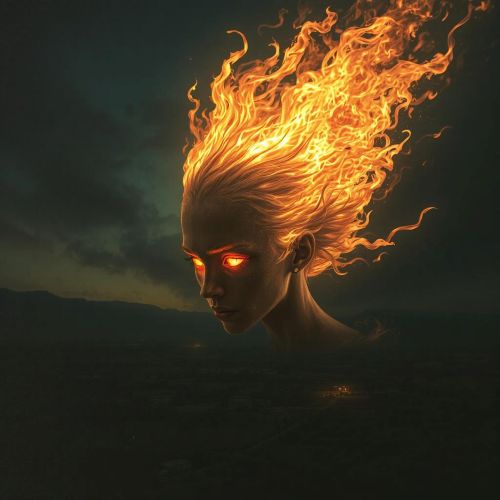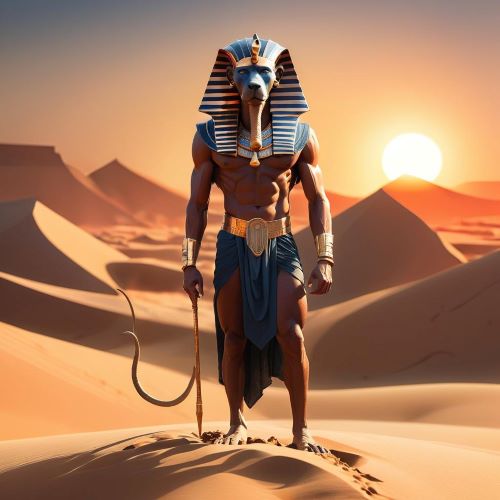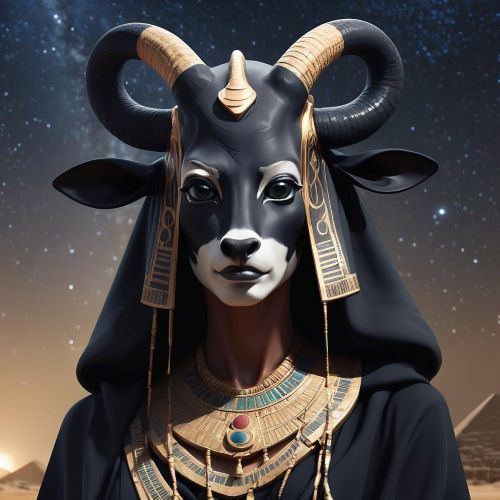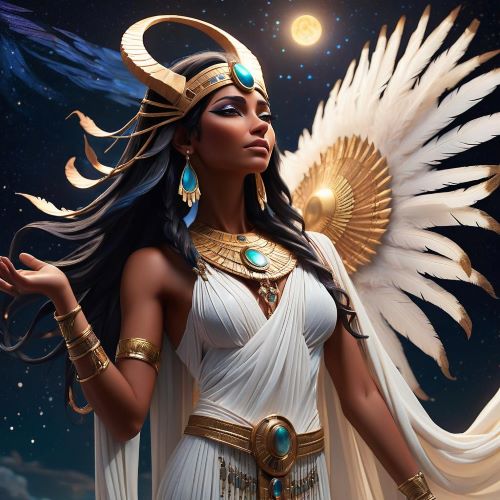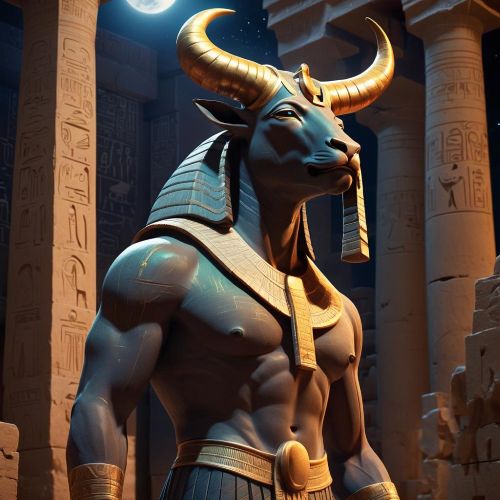Anubis : God of the Dead
At a glance
| Description | |
|---|---|
| Origin | Egyptian Mythology |
| Classification | Gods |
| Family Members | Ra (Father), Hesat (Mother), Osiris (Father), Nephthys (Mother) |
| Region | Egypt |
| Associated With | Embalming, Death, Funeral Process, |
Anubis
Introduction
In the intricate web of Egyptian mythology, Anubis emerges as a central figure, symbolizing the transition between life and death. Revered as the custodian of mummification and the guide for souls in their journey to the underworld, Anubis embodies both the fearsome and the revered aspects of existence. Also known as Inpu, Inpw, Jnpw, or Anpu in Ancient Egyptian, he is one of the oldest gods of Egypt, likely evolving from the earlier jackal god Wepwawet. Anubis is the god of funerary rites, protector of graves, and guide to the afterlife, standing as a prominent and enigmatic deity in Egyptian lore.
Physical Traits
Anubis, commonly portrayed as either a jackal or a humanoid figure with a jackal head, embodies the complex relationship ancient Egyptians had with these scavengers often found in cemeteries. While jackals were known to disturb the dead, they also symbolized guardianship over the deceased, a duality reflected in Anubis’s role as both protector and overseer of funerary rites.
His association with the color black further adds depth to his symbolism. In contrast to modern associations with mourning, black represented renewal and the fertile soil of the Nile River in ancient Egypt. It also mirrored the hue of embalmed corpses. Thus, Anubis’s black form links him to the transformative nature of death and the promise of new life in the afterworld.
Depicted alongside his brother Wepwawet, who shares his canine attributes but with grey or white fur, Anubis stands as a visual representation of power and enigma. With his iconic jackal-headed form atop a human body, adorned with regal adornments and holding symbols of divine authority, Anubis commands reverence and awe, embodying the solemnity and majesty of the Egyptian pantheon.
Family
Anubis’s lineage remains a topic of debate among scholars, reflecting the evolution of Egyptian mythology over time. Initially regarded as the sole “Lord of the Dead,” his role shifted with the emergence of the Osiris myth, wherein he was portrayed as the son of Osiris, the god of the underworld, and Nephthys, Osiris’s sister. This integration into the Osiris mythos solidified Anubis’s significance within the pantheon. Another theory proposes that Anubis may have originated from the earlier jackal god, Wepwawet, with both deities sharing canine attributes and connections to death. Over time, these characteristics possibly merged, contributing to the development of Anubis’s identity.
Anubis is also associated with a female counterpart, Anput, who shares his jackal-headed form and associations with funerary rites. Some scholars suggest she could be a later development or a specific aspect of Anubis himself. Despite the variations in his mythology and parentage, Anubis remains a central figure in Egyptian cosmology, serving as a guardian and guide in the afterlife, regardless of his divine lineage.
Other Names
In the expansive realm of Egyptian mythology, Anubis is celebrated under a plethora of epithets, each reflecting a distinct facet of his character. Among these, he is commonly known as “Anpu” or “Inpu,” denoting his status as the divine overseer of the dead. Additionally, Anubis is sometimes equated with the Greek deity Hermes, leading to his hybridized designation as “Anubis-Hermanubis” in Greco-Roman syncretism. These alternative titles highlight the dynamic nature of ancient religious beliefs and the interplay between different cultural traditions.
Anubis’s epithets encompass a range of symbolic meanings, such as “First of the Westerners,” emphasizing his role as the guardian of souls buried on the western bank of the Nile. He is also hailed as “Lord of the Sacred Land,” signifying his sovereignty over the desert territories of the afterlife, and “He Who Is upon His Mountain,” symbolizing his vigilant presence over tombs and necropolises. These varied appellations deepen our understanding of Anubis’s significance within Egyptian cosmology, revealing the multifaceted nature of this revered deity.
Powers and Abilities
Anubis’s multifaceted character encompasses various roles and powers integral to Egyptian mythology. From the earliest periods, he was revered as both a guardian of graves and an embalmer, ensuring the proper preservation of the deceased. However, his significance extends far beyond mere symbolism, as he possesses potent abilities crucial to the afterlife.
One of his primary functions is overseeing the mummification process, ensuring that the deceased’s body is meticulously prepared for its journey into the next life. Additionally, Anubis assumes a pivotal role in the judgment of souls in the Hall of Ma’at, where he weighs the hearts of the departed against the feather of truth. As a psychopomp, he guides souls through the perilous journey to the underworld, safeguarding them from malevolent forces and ensuring their safe passage to the realm of Osiris.
Moreover, Anubis serves as the guardian of tombs and cemeteries, warding off evil spirits and preserving the sanctity of the deceased’s eternal rest. His array of powers and responsibilities underscores his unparalleled significance within Egyptian cosmology, as he embodies both the protector and judge of souls, maintaining the cosmic order of Ma’at with unwavering vigilance.
Modern Day Influence
Anubis’s enduring legacy transcends the ages, leaving an indelible mark on modern culture and society. Across various artistic mediums, from literature to film and video games, his enigmatic presence continues to captivate audiences worldwide. Often depicted as a symbol of mystique and intrigue, Anubis embodies themes of death, rebirth, and transformation, making him a compelling character for creative exploration.
Beyond entertainment, Anubis’s influence extends into contemporary society, where his imagery adorns jewelry, fashion, and home decor, serving as a powerful emblem of protection and guidance. In esoteric and spiritual circles, he is revered as a deity associated with transformation and renewal, further enriching his significance in modern belief systems.
Despite his relatively minor role in ancient Egyptian mythology, Anubis’s iconic jackal-headed image remains a potent symbol of ancient Egypt and its rich cultural heritage. Through the passage of time, his legacy endures, continuing to resonate in myriad ways across the globe.
Related Images
Frequently Asked Questions
Is Anubis good or bad?
Neither angel nor demon, Anubis walked the line between life and death, protecting souls in their journey, ensuring fair judgment, and guarding their final rest. Though death’s shadow clung to him, he offered hope and rebirth, making him a complex deity, revered for his role in the grand dance of existence.
What was Anubis god of?
From embalming bodies to weighing hearts, Anubis wore many hats: protector of the dead, guide through the underworld, guardian of tombs, and judge in the afterlife. He wasn’t just the grim reaper, but a complex deity ensuring safe passage, fair judgment, and even potential rebirth, making him a key figure in the dance of life and death in ancient Egypt.
Does Anubis have a wife?
Anubis, jackal-headed lord of the dead, shares his underworld duties with his wife Anput, the goddess of embalming and protector of women and children. Together, this jackal-headed power couple guides souls, weighs hearts, and guard the living and dead, their love story woven into the very fabric of Egyptian beliefs about life, death, and the mysteries in between.
Is Anubis Seth's Son?
Anubis’ parentage is shrouded in mystery, with whispers of both Osiris and Seth swirling around him. The most accepted tale has him born to Nephthys, disguised as Isis, and Osiris, raised by Isis with a mother’s love, though some murmurings claim Seth as his father too. Regardless of his origins, Anubis carved his own path as the jackal-headed lord of the dead, guiding souls and weighing hearts in the grand dance of Egyptian mythology.
How Anubis died?
Anubis, protector of the departed, never felt death’s cold touch. He transcends mortals’ cycles, a constant guide in the underworld’s shadows. Some whisper of merging with Osiris, others of retreat, but all agree: his watchful gaze never fades, a beacon for souls on their endless journey.


